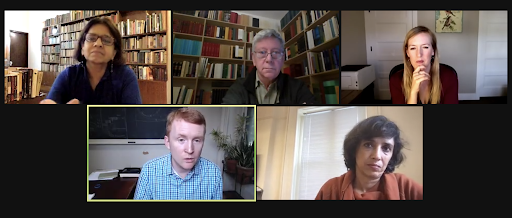Experts discuss climate policy and economic inequity in the ninth Yale Development Dialogue
Yale Economic Growth Center, Department of History and Jackson Institute of Global Affairs co-host seminar focusing on climate priorities in preparation for upcoming United Nations conference.

Yale economics professors and famed environmentalists gathered on Tuesday to discuss the commitments of high and low-income countries to addressing climate change while correcting economic inequity.
This event was the ninth in the Yale Development Dialogue series — a set of events intended to bring together economists, historians, policymakers, journalists and other experts to discuss issues that affect countries of varying economic statuses through an interdisciplinary lens. The Yale Economic Growth Center, Department of History and Jackson Institute of Global Affairs co-hosted the webinar. Tuesday’s panelists focused on climate policy in the context of the United Nations’ upcoming Climate Change Conference of the Parties, or COP26, which is scheduled to take place in Glasgow between Oct. 31 and Nov. 12. Specifically, the panelists discussed relationships between global economic injustice and climate activism.
“Unless you have a collaborative agreement [between the rich and poor] … you will not have an agreement that is effective,” panelist Sunita Narain, a famed Indian environmentalist, said of the upcoming COP26 proceedings. “If it is not affordable growth, if it is not inclusive growth, it is not sustainable.”
In addition to Narain, who is the director general of the India-based research institute Centre for Science and Environment, panelists included John Haldon, professor emeritus of history at Princeton; Nicholas Ryan, assistant professor of economics at Yale; and Rohini Pande, professor of economics and director of Yale’s Economic Growth Center. The session was moderated by Catherine Cheney ’10, a senior reporter who covers for Devex the role of technology, innovation and philanthropy in achieving the United Nations’ Sustainable Development Goals.
A central topic of the panel was the effect of COVID-19 on international climate policy and attitudes. Pande, Narain and Ryan all described a sense of pessimism about the likelihood of a global climate response based on individual “nationalistic responses” to the pandemic, as Pande said.
“This is the worst time in the world. The leadership in the world literally sucks,” Narain told attendees. “Yet you have vaccine racism happening today. Yet you have a divided world. What does that tell us about the future of climate change?”
Ryan, whose research includes the examination of energy policy in India, quantified the discrepancy. He explained that it would have required about $70 billion to vaccinate every person against COVID-19. The scale of investment needed for climate change, however, is about 1,500 times greater.
“That is how much larger the problem is, just in money terms, and the reason to be a little bit pessimistic,” Ryan said. “If the U.S. or China are not willing to unilaterally step up … and eliminate COVID from the world … then what does that say about climate change?”
Ryan, however, noted some potential room for hope, pointing to progress in renewable energy investment in developing countries.
However, not all panelists agreed that renewable energy is the right solution to address climate change, particularly for low-income countries.
“In my part of the world, solar is still expensive for the poorest in the country,” Narain said, adding that some Indians cannot afford electricity, even when it comes from “dirt-cheap coal.”
While Ryan responded that the most recent prices on solar in India were about 2.5 rupees — roughly 3.4 United States cents — per kilowatt-hour, as compared to 3.5 or 4.0 rupees for coal, Narain pointed out that the upfront cost of renewable energy can be prohibitive to people and to communities in poverty.
A January report from Oxfam found that the richest one percent of the global population have used twice as much carbon as the poorest 50 percent over the last 25 years. However, as Cheney pointed out during the panel, the global poor are hit hardest by the effects of the climate crisis, from droughts to housing instability to food shortages.
This disparity also affects some of COP26’s goals, which include identifying the necessary 2030 emissions reduction targets for each country to reach net-zero emissions by the middle of the century.
Pande raised a question to fellow panelists concerning their thoughts on the efficacy of net-zero strategies and whether they are sufficient. In Narain’s view, they are not.
Narain pointed to two flaws with net-zero initiatives: equity concerns and insufficient technology. Per the Intergovernmental Panel on Climate Change, the world should reach a state of net-zero emissions by 2050. However, “there’s no way the U.S. and India can have the same timeline,” Narain said, speaking to general issues with prescribing the same directive across countries of varied income statuses. “That discussion today is so over that we shouldn’t even waste our time,” she added.
Instead, Ryan said global superpowers like the United States and European nations need to step in. As John put it, a fundamental problem in the field now is how to build geopolitical changes, such as China’s growing influence on many African countries, into climate policy framework, especially as these changes affect lower-income communities.
The next Yale Development Dialogue is scheduled for Oct. 28 and will focus on global health equity.







